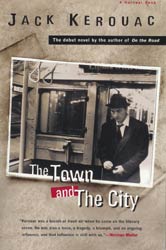Video by Kevin T 5, Quan T 6, Simon M 6.
Wednesday, December 12, 2007
In case you are interested in Ed Sanders
Tuesday, December 11, 2007
Winter Break Assignment
 due: Friday, January 4th, 2008
due: Friday, January 4th, 2008 
 ner, (enough said) though much different. It is only out in hardback, but is worth it. You will need to find your own copy.
ner, (enough said) though much different. It is only out in hardback, but is worth it. You will need to find your own copy.Friday, December 7, 2007
Passage Explication Assignment—James Joyce Period 6
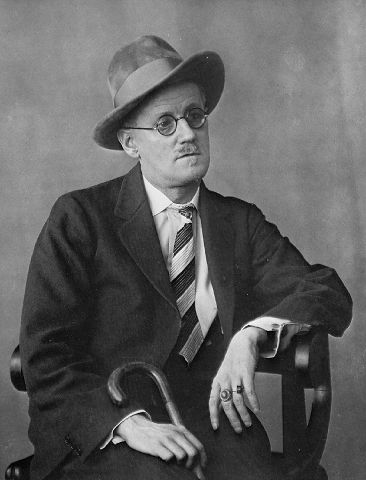
For this Essay on James Joyce’s A Portrait of the Artist as a Young Man, you need to combine two passage explications to create an original thesis.
- Your paper should be about your strand. This should be the title of the paper.
- One passage needs to be from chapter 1 and one passage needs to be from chapter 2.
- One passage needs to be something we have not covered in class.
- This should be 4-6 pages, typed, double-spaced, Times New Roman.
- Please post on the blog on Monday. Leave spaces between paragraphs for formatting.
Reminder to read the handout on passage explications and go through this process.
A passage explication is an essay that takes apart the pieces of a prose passage to demonstrate how it creates meaning – its main question can be reduced to the simple idea of “What does the passage mean? What is its purpose? How does it create that meaning and achieve its purpose? How does it fit in with the rest of the text (if available)?
Due Monday, December 10th, between 7a.m. and 7p.m.
Period 6 Post here. Period 6 Post here. Period 6 Post here.
Passage Explication Assignment—James Joyce Period 5

- Your paper should be about your strand. This should be the title of the paper.
- One passage needs to be from chapter 1 and one passage needs to be from chapter 2.
- One passage needs to be something we have not covered in class.
- This should be 4-6 pages, typed, double-spaced, Times New Roman.
- Please post on the blog on Monday. Leave spaces between paragraphs for formatting.
Sunday, November 25, 2007
A Lesson Before Dying & selections from Joyce's Dubliners Period 6

Members:
Quan T6
Matt S6
Simon M6
Sunday Dec 2: Read to pg 102 (up to ch 14) ALBD
Wednesday Dec 5: Blog Session 1 ends ALBD
Saturday Dec 8: Read pgs 103 – 177 (ch 14 – 22) ALBD
Tuesday Dec 11: Blog session 2 ends ALBD
Saturday Dec 15: Read to finish (ch 23 – 31) ALBD
Monday Dec 17: Blog session 3 ends ALBD
JJ short stories TBAMrs. Dalloway Period 6

Members:
Jessica S6
Kathryn W6
Faedhra W6
Emily L6
1. Read to page 65 by Nov 30, Friday Group Discussion/ Blog from Dec 2, Saturday to Dec 3 Monday *Check blog throughout the days
2. Read to page 130 by Dec 7, Friday Group Discussion/ Blog from Dec 8, Saturday to Sunday *Check blog throughout the days
3. Read the rest of the book, to page 197 by Dec 14, Friday Group Discussion/ Blog from Dec 15, Saturday to Sunday *Check blog throughout the days
4. Read the FORWARD & TBD by Dec 18, Tuesday (unsure if there is other additional reading with this book) Final Group Discussion/ Blog on December 19, Wednesday. *Check blog throughout the day
Invisible Man Period 6
Madame Bovary Period 6

Members:
Michelle P6
Meg S6
Katie S6
Sarah C6
Ghetto Nation & Savage Inequalities Period 6 Group 2

Members:
Michael R6
Emily R6
Benwit L6
Alexander A6
Christina H6
Reading Lolita in Tehran Period 6

Members:
Linda Y6
Shuyi G6
Erika R6
November 26
Finish Chapters 1 and 2
pg. 1 - 154
November 26 to 30
Blog on Chapters 1 and 2
December 3
Finish Chapter 3
pg. 155 - 254
December 3 to 7
Blog on Chapter 3
December 10
Finish Chapter 4
pg. 255 - 340
December 10 to 14
Blog on Chapter 4
December 17
Finish Epilogue
December 17 to 23
Blog on Epilogue and Overall Thoughts on the Book
Love in the Time of Cholera Period 6
Members:
Thespina G6
Jessica F6
Ping L6
Luana D6
Tuesday Nov. 26-start blog session #1 on pages 1-163.
Saturday Dec. 1-Blog Session #1 Due!!
Monday Dec. 3-start blog session #2 on pages 165-224
Saturday Dec. 8-Blog Session #2 Due!!
Monday Dec. 10-start blog session #3 on pages 224-278
Saturday Dec. 15-Blog Session #3 Due!!
Monday Dec 17-start blog session #4 on pages 279-348
Saturday Dec 22-Blog Session #4 Due!!
Ghetto Nation & Come On People Period 6 Group 1

Members:
Brian A6
Nina F6
Elina R6
Emily T6
Finish Ghetto Nation by Cora Daniels by December 1, 2007
Start Bill Cosby's Come On People on December 1, 2007
First posts on First half of Ghetto Nation due: December 1, 2007 (at
least five a per person)
Second blog post on second half of Ghetto Nation due: December 5,
2007 (again try for at least five a piece)
Third blog post Come on People (first half) due: December 10, 2007 (Not to be
repetitive but try for at least five a piece again)
Final Blog Come on People (second half and maybe connecting the two books) due:
December 19, 2007
Madame Bovary Period 5

Members:
Casie S5
Stephanie P5
Angela S5
Janelle C5
Monday November 26th
Read the first 173 pages of the book.
First blog check will be on this day if it is set up. If not set up by this day, the blog check will be on Wednesday the 28th.
Read up to page 225.
Blog Check.
Monday December 10th
Read up to page 255
Blog Check
Monday December 17th
Read up to page 303
Final Blog Check
Ghetto Nation & Savage Inequalities Period 5 Group 2

Members:
Danielle S5
Mario R5
Diana P5
Kenneth M5
WEDNESDAY NOVEMBER 28TH
due date to finish reading Ghetto Nation.
SATURDAY DECEMBER 1ST.
Post the first blog about ghetto Nation
SATURDAY DECEMBER 8TH
Secong blog post on Ghetto Nation
WEDNESDAY DECEMBER 12TH
due date to be done reading the second book.
SATURDAY DECEMBER 15
1st blog post on second book
WEDNESDAY DECEMBER 19
Last blog on second book due
FRIDAY DECEMBER 21
Final bog posts due on both books.
Snow Country & The Sound of Waves Period 5
 Members:
Members: Wendy C5
Shaun N5
Chris O5
Kevin T5
Kristin D5
November 30 – Finish reading Part One of Snow Country
December 2 – 4-5 blog comments due from each member
December 5 – Finish reading Part Two of Snow Country
December 8 – 4-5 blog comments due from each member
December 12 – Finish reading first half of The Sound of Waves
December 15 – 4-5 blog comments due from each member
December 19 – Finish reading second half of The Sound of Waves
December 21 – 4-5 blog comments due from each member
Franz Kafka's Metamorphosis & Other Stories Period 5

Members:
Caitlyn H5
Mark D5
Rodney B5
William C5
Monday December 2nd: Finish reading the Foreward and “Description of a Struggle” First blog is due.
Thursday December 6th: Finish reading “Metamorphosis” and second blog is due.
Wednesday December 12th: Finish reading “Wedding Preparations in the Country”, “The Judgement”, “In the Penal Colony”, and “The Village Schoolmaster [The Giant Mole]” and third blog is due.
Tuesday December 18th: Finish reading “Blumfeld, an Elderly Bachelor”, “The Warden of the Tomb”, “A Country Doctor”, “The Hunter Gracchus”, “The Hunter Gracchus: A Fragment”, “The Great Wall of China”, and “The News of the Building of the Wall: A Fragment.” Final blog is due
Ghetto Nation & Savage Inequalities Period 5 Group 1

Members:
Kathleen D5
Kev Tra5
Ronald D5
Ashley S5
Wednesday, November 28th: Blogs on up to chapter 4 due
Wednesday, December 5th: Blogs on the remaining chapters of Ghetto Nation due
Wednesday, December 12th: Blogs on up to chapter 4 of Savage Inequalities due
Wednesday, December 19th: Blogs on the remaining chapters of Savage Inequalities due
Reading Lolita in Tehran Period 5

Group:
Ricki L5
Doris T5
Natalia A5
Stephen T5
Edmund H5
Nov. 29th Finish reading Section Lolita
Sat December 1st: Have blog on Lolita completed
December 6th: Finish Reading Gatsby
December 8th: Have blog on Gatsby completed
December 13th: Finish Reading James
December 14th: Should be starting Austen
December 15th: Have blog on James completed
December 19th: Finish reading Austen
December 21st: Have blog on Austen completed
Group members are encouraged to read ahead and take 10-20 minutes a day checking the blog and posting comments, questions, answers, etc.
Thursday, November 15, 2007
Creating a Personal Mythos (Olsonian-style)

Wednesday, November 14, 2007
Olson links for y'all
 First here are the links for the packet of poems that you have:
First here are the links for the packet of poems that you have:Also, this is a UPENN's site that lists a bunch of Olson voice recordings.
A very good site by The University of New York / Buffalo for Olson source material.
Required: Finally, I would like you all to read this essay: Projective Verse before class.
Do your best with all of this--the more questions you have, the more I can sense that you actually read it. This is not easy stuff, ladies and gents--but it is important to your existence as a human.
Polis Is This


here is Henry Ferrini's website--there's also a bio on him....please read up and be prepared. Oh yeah, you Kerouac scholars might want to notice that he has a film on Kerouac called Lowell Blues.
here's a review of Lowell Blues
here's a review of Polis Is This, followed by a bunch of blog posts on Olson by Ron Silliman. Worth reading--you bet.
Tuesday, November 13, 2007
Plum Plum Pickers passage explications

in this comment stream if you are period 6.
Plum Plum Pickers passage explications

in this comment stream if you are period 5.
I have too Munch to do...
This is Edvard Munch's "The Scream". Munch was a very good painter and there is a good Simpsons version of this painting--but I digress. The title for this painting has always intrigued me--Is life really scary, i.e--worthy of a scream, or absurdly funny, as in ha ha that's a scream?
Anyway, you may want to scream because of my sophomoric puns--but I just want to dance.
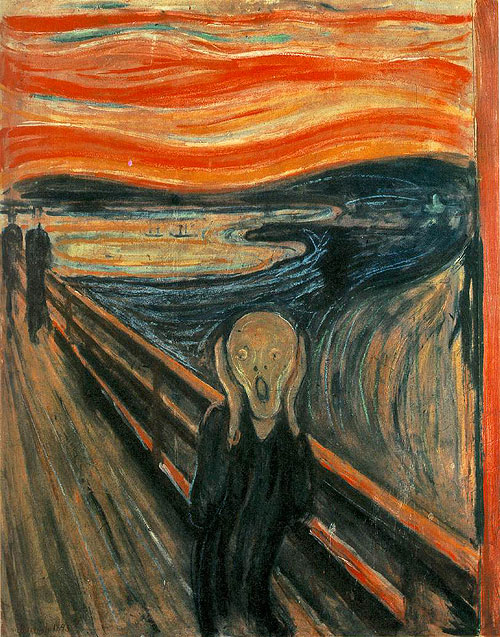
Tuesday, November 6, 2007
Pronoun-Antecedent Agreement
Literature Circles: December
Here are some works of Tragedy and / or Modernism (though not all choices fit perfectly)
Madame Bovary, Gustave Flaubert
A Lesson Before Dying (supplemented by selections from Joyce's Dubliners), Ernest J. Gaines
Ghetto Nation, Cora Daniels and Savage Inequalities, Jonathan Kozol
Reading Lolita in Tehran, Azar Nafisi
Snow Country, Yasunari Kawabata (plus one more from the list in back of book of Japanese Literature)
Metamorphosis, Franz Kafka
Invisible Man, Ralph Ellison
Mrs. Dalloway, Virginia Woolf
Town and the City, Jack Kerouac
A Vonnegut Novel (Slaughterhouse-Five, supplemental material)
Things Fall Apart (Chinua Achebe) will need a supplement (Possibly Amiri Baraka)
Othello and Tempest, Shakespeare (with essays)
Love in the Time of Cholera, Gabriel García Márquez
Thursday, November 1, 2007
Myth and the Modern World Quartely Test
Be prepared to explain the significance of either of these quotations and explain how they relate to Modernism.

Portrait of Kafka done by Andy Warhol.
Kafka described in a letter to Klopstock: “If we were on the right road, having to leave it would mean endless despair. But we are on a road that only leads to a second one, and then to a third one, and so forth, and the real highway will not be sighted for a long time—perhaps never—and we drift in doubt, but also in inconceivably beautiful diversity; so the accomplishment of hopes remains an always unexpected miracle, but in compensation, the miracle remains forever possible.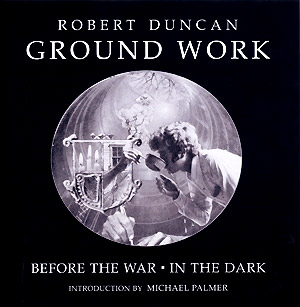 cover of Duncan's book done by the painter / collage artist Jess (Collins)
cover of Duncan's book done by the painter / collage artist Jess (Collins)Friday, October 26, 2007
Independent Reading Assignments (1st Person Narrative)

[1] I do not provide health insurance. Welcome to the world of contracted labor, boys and girls.
Wednesday, October 24, 2007
College Essay Scoring Guide

- 50 points--Writer demonstrates control of sentence structure, grammar and usage.
- 40 points--Errors do not interfere with communication. There are few errors relative to length.
- 30 points--Errors interfere with communication.
50 points--Insight and creativity, readability, and is your essay compelling? A note to remember your audience here and the purpose of your essay: All writers do this on some level--we consistently look at audience and purpose when we analyze writing. If you are using this to apply to college, keep in mind that the admissions officers are looking for intelligent and motivated students who will be successful at their school. Your essay should:
- Be personal (instead of general)
- Be concrete (instead of abstract--can you make your reader "see" your world?)
- Include anecdote (instead of summary--this is not a resume)
- Include a hook or lead
- Have sophisticated and / or subtle organization
- Show a sophisticated or subtle mastery of language
- AND AVOID CLICHE!
PLEASE PRINT THIS PAGE OUT AND ATTACH TO THE BACK OF YOUR ESSAY SO I CAN WRITE COMMENTS. WHEN YOU PRINT, MAKE SURE YOU ONLY PRINT THIS PAGE.
Monday, October 22, 2007
College Essay Prompts
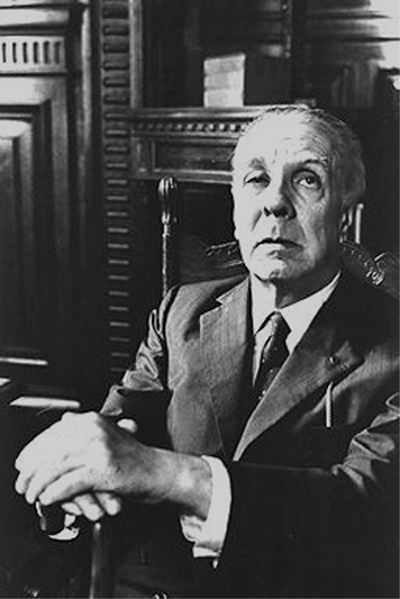 photo of Borges
photo of BorgesThe prompts provided are often a starting point—it’s not really about which prompt you choose to answer, but HOW you use the topic to write an essay. Remember the Borges, “people tend to prefer the personal to the general, the concrete to the abstract”(Blindness). You will notice that the questions are vague, repetitive, and general. You could almost adapt any good essay to fit a prompt.
Anyway, here are the common application prompts*
- Discuss some issue of personal, local, national, or international concern and its importance to you.
- Indicate a person who has had a significant influence on you, and describe that influence.
- Describe a character in fiction, a historical figure, or a creative work (as in art, music, science, etc.) that has had an influence on you, and describe that influence.
- A range of academic interests, personal perspectives, and life experiences adds much to the educational mix. Given your personal background, describe an experience that illustrates what you would bring to the diversity in a college community, or an encounter that demonstrated the importance of diversity to you.
- A prompt of your choice is another option. (See below)
I also have a handout from Ms. C that lists a number of essay prompts (from way back in the day)… I’m going to break into my I’m older than you persona now: “when I applied to college I actually had to write a separate essay for each school because each school had a question—oh, and life was (of course) harder back then—we suffered like you kids nowadays have no idea of….”(Kidding of course).
I would be happy to photocopy these for you. They might stir the creative juices in a way that the above prompts do not.
Commentary on Camus’ “Myth of Sisyphus” discussion
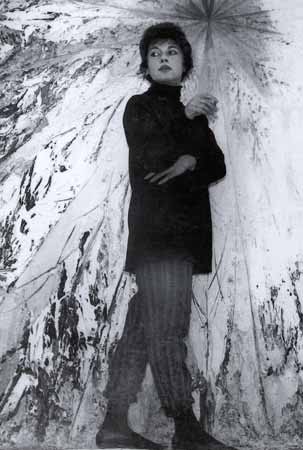 Jay De Feo 1958, one of my favorite painters, standing in front of her painting The Rose--a really amazing piece that you have to stand in front of to appreciate the intensity of it.
Jay De Feo 1958, one of my favorite painters, standing in front of her painting The Rose--a really amazing piece that you have to stand in front of to appreciate the intensity of it. Here’s an example from the Period 5 comment stream. (This was the most popular picked model thesis sentence):
- In Camus’s essay, The Myth of Sisyphus, Camus introduces the possibility that life is meaningless. Camus’s interpretation of the myth reflects of the idea of absurdity and how giving meaning to life in ways such as socially or religiously, is inevitably pointless because in the end death is terminal. Camus’s suggests that happiness arises from absurdity when one learns and accepts death. Although Sisyphus’s futile punishment is meant to be eternal and torturous Camus’s is able to help readers view Sisyphus as a happy man because he was able to come to terms with his punishment.
This is a wonderfully written introduction—however, it is a summary of what is in the essay and never shows how Camus creates theme through technique—it never offers how the language works. Though the author of this sentence should be lauded for her deft phrasing of language, if you read some of the sentences more closely, they are summary and sometimes self-evident.
In the Period 6 comment stream, this was the most popular thesis picked for its quality:
- In “The Myth of Sisyphus,” Albert Camus reveals the unyielding power of a man’s consciousness when Sisyphus overcomes his punishment. Camus exaggerates the pointlessness and cruelty of Sisyphus’ eternal sentence to rolling an enormous rock up a hill through repetition and his choice of diction. The author tone remains subtle throughout the story until the last paragraph. Camus makes a strong statement at the end of the story, which summarizes his lesson for the readers. Similarly, it is at the end of a myth that Sisyphus, the tragic hero, realizes his consequences and accepts his fate.
Wednesday, October 17, 2007
Scoring The Parable of the Blind Period 6

Jean-Michel Basquiat, Great Jones Street, New York, 1987--a painter that I really like.
Hello everybody--I am giving you class time for this--so if you have not done so already, please check out some of the model papers from the Camus Archive before the weekend ends. Also, it might be nice to add a comment where you feel you can add to the discussion. Though this is ungraded, I feel as if it is extremely important to establish some intellectual camaraderie among yourselves.
- Camus Archive Model Paper 2
- Model Selections from the Camus Papers Archive 2
- Camus Archive Model Paper 1
- Model Selections from the Camus Papers Archive
For today's class (and you should finish by Friday at 3:00p.m. by posting in the comment stream below) I would like you to read the batch of papers that I received for IX The Parable of the Blind.
You should read over the scoring guide for Open Response prompts and consult it for every paper. You should also review the handout on Explicating a Poem before you start. Even though I helped write these documents and use them all the time, I still do this before grading papers.
In the comment stream below, I would like to know which of the papers you would give an A or a B with your specific comments on why--(I am looking for more than the language on the rubric here--be specific in your comments on how you think these papers successfully explicate the poem.) Finally, please feel free to add your comments on anything in the paper--(ideas you have, places that could have been expanded, ways to phrase language more specifically or better, or even just fixing typographical errors.) None of these papers received a 100.
Thank you to those who are lucky enough to have your papers in this group. We all appreciate this.
PERIOD 6 POST HERE PERIOD 6 POST HERE PERIOD 6 POST HERE
Scoring The Parable of the Blind Period 5
Hans Hofmann, photograph by Arnold Newman, 1960--a painter that I really like.
Hello everybody--I am giving you class time for this--so if you have not done so already, please check out some of the model papers from the Camus Archive before the weekend ends. Also, it might be nice to add a comment where you feel you can add to the discussion. Though this is ungraded, I feel as if it is extremely important to establish some intellectual camaraderie among yourselves.
- Camus Archive Model Paper 2
- Model Selections from the Camus Papers Archive 2
- Camus Archive Model Paper 1
- Model Selections from the Camus Papers Archive
For today's class (and you should finish by Friday at 3:00p.m. by posting in the comment stream below) I would like you to read the batch of papers that I received for IX The Parable of the Blind.
You should read over the scoring guide for Open Response prompts and consult it for every paper. You should also review the handout on Explicating a Poem before you start. Even though I helped write these documents and use them all the time, I still do this before grading papers.
In the comment stream below, I would like to know which of the papers you would give an A or a B with your specific comments on why--(I am looking for more than the language on the rubric here--be specific in your comments on how you think these papers successfully explicate the poem.) Finally, please feel free to add your comments on anything in the paper--(ideas you have, places that could have been expanded, ways to phrase language more specifically or better, or even just fixing typographical errors.) None of these papers received a 100.
Thank you to those who are lucky enough to have your papers in this group. We all appreciate this.
PERIOD 5 POST HERE PERIOD 5 POST HERE PERIOD 5 POST HERE
Tuesday, October 16, 2007
The Myth of Sisyphus Class Discussion Period 6

After skimming your Williams papers, I think we need a little more work on developing thesis statements for explication--after all, if your thesis lacks depth, your paper probably will as well. Please refer to handout on explications--and remember that your thesis must show HOW meaning is developed through writing. This is a hard concept by the way--and if you are having trouble with it, it is because it is a really hard thing to master. You are certainly not alone here, but we still need to figure it out.
This post is worth 20 points:
It is due by Friday at 3:00p.m.
- 5 points for--generating a successful thesis statement.
- 5 points for--explaing why one of your peer's thesis statements is successful. (You may need to post twice if you are one of the first to go.) I want some depth here--not just language from a rubric. I want an explanation of WHY the thesis staement is one of depth.
- 10 points for--a continuation of something from class discussion. Just like last time, there should be some depth here (I think 250 words is a minimum) and you should be providing specific textual evidence to analyze. Let's work on integrating the evidence here this time instead of pasting large chunks of text in the post.
PERIOD 6 POST HERE PERIOD 6 POST HERE PERIOD 6 POST HERE
The Myth of Sisyphus Class Discussion Period 5

- 5 points for--generating a successful thesis statement.
- 5 points for--explaing why one of your peer's thesis statements is successful. (You may need to post twice if you are one of the first to go.) I want some depth here--not just language from a rubric. I want an explanation of WHY the thesis staement is one of depth.
- 10 points for--a continuation of something from class discussion. Just like last time, there should be some depth here (I think 250 words is a minimum) and you should be providing specific textual evidence to analyze. Let's work on integrating the evidence here this time instead of pasting large chunks of text in the post.
PERIOD 5 POST HERE PERIOD 5 POST HERE PERIOD 5 POST HERE
Thursday, October 11, 2007
Assignment for Williams Explication
William Carlos Williams has a wiki. Read it for some background info if you are interested, but since this is an explication--nothing you read or research is relevant for this type of paper. You are writing a straight-up explication on a poem. Please review the handout on what an explication is as well as the open-response scoring guide before you begin (and before you publish your paper) in the proper post below.
I will be unreachable by email this weekend, but you can feel free and use this comment section if you have questions--maybe one of your peers can answer your question or maybe you can bounce ideas off each other.
Either way, I will see you all bright and early on Monday--we will be reading more Camus. If you have personal needs for your paper, please address them with me outside of class time on Monday. Thanks Blogsters.
III The Hunters in the Snow

Please Post your explication of "III The Hunters in the Snow" by William Carlos Williams here by Monday October 15th at 3:00p.m. This should give you time after school if you need computer access for whatever reason.
IV The Adoration of the Kings

Please Post your explication of "IV The Adoration of the Kings" by William Carlos Williams here by Monday October 15th at 3:00p.m. This should give you time after school if you need computer access for whatever reason.
V Peasant Wedding

Please Post your explication of "V Peasant Wedding" by William Carlos Williams here by Monday October 15th at 3:00p.m. This should give you time after school if you need computer access for whatever reason.
VI Haymaking

Please Post your explication of "VI Haymaking" by William Carlos Williams here by Monday October 15th at 3:00p.m. This should give you time after school if you need computer access for whatever reason.
VII The Corn Harvest
VIII The Wedding Dance in the Open Air
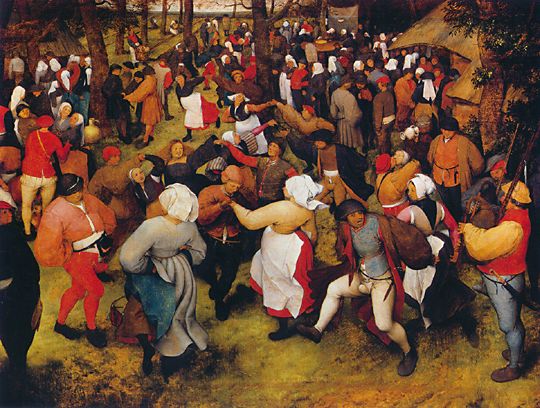
Please Post your explication of "VIII The Wedding Dance in the Open Air" by William Carlos Williams here by Monday October 15th at 3:00p.m. This should give you time after school if you need computer access for whatever reason.
IX The Parable of the Blind
Camus Archive Model Paper 2
So many of you all tried to write about the sun as a symbol in the novel--but you never really went beyond locating it as a symbol. Here, Angela not only shows HOW the sun works as a symbol, but uses it to develop a solid character analysis and connect it to the Oedipus myth--another thing a bunch of you tried to do to establish M as a tragic hero. But again, proving a character is a tragic hero is a bit simplistic and formulaic. The first body paragraph does a super job with the pacing of language to create a dream-like state in the narrator (a deft analysis)--and Angela continues on to transition to "blindness" as a topic, investigating the effect on many levels.
There are times in life when one becomes completely overwhelmed by the intensity of a situation and leaves reality. These situations allow the human senses to become sharpened and discover things that one would normally not notice. In two passages from The Stranger, Albert Camus suggests that the intensity and blinding quality of the sun cause Monsieur Meursault to enter a dream-like state and ironically discover the truths and reality of his life. By the end of the first chapter, Monsieur Meursault is at his mother’s funeral and buries her and by the end of the first half of the book he murders an Arab. Both passages deal with death which is a topic that is difficult to accept and understand. Death makes people start to question their own lives and try to find the purpose in living, even though, in the end everyone will die. Although Meursault does not want to acknowledge or does not seem to care about the death of his mother or the fact that he is killing the Arab, the intensity of the sun consumes him and enables him to realize the truth in his life. Camus suggests this through his use of imagery of the sun and imagery of the eye and blindness. The imagery of the sun reveals when Meursault’s senses start to become acute and make the reader feel as if he has entered a dream-like state. The imagery of the eye reveals the qualities of Meursault that make him a tragic hero which is connected to the mythical story of Oedipus. Also, his use of diction contributes to the feeling that Monsieur is in another world and has left reality.
When Meursault is on his way to bury his mother, the sun is beats on him and makes him exhausted. Up until this point in the story Meursault has not come to terms with or has acknowledged his mother’s death. While walking to bury her he is completely overwhelmed and says, “…everything seemed to happen so fast…that I don’t remember any of it anymore”(17). Meursault’s short and choppy sentences suggests that he is leaving reality and entering a dream-like state. He continues to say, “Except one thing...”(17). This one thing that he recalls is a statement that the nurse made about the heat. She says, “‘If you go slowly you risk getting sunstroke. But if you go too fast, you work up a sweat and then catch a chill inside the church’”. This quotation is a metaphor for life and reveals that in life there will always be consequences. Although one may try to avoid certain things such as “sunstroke”, in the end one will “catch a chill inside the church” or suffer. This suggests that although Muersault may try to avoid acknowledging his mother’s death it is unavoidable and the end result will be feelings of pain and guilt.
Meursault responds to the nurse by saying, “She was right. There was no way out”(17). Meusault agrees and believes that life is inescapable and the intensity of the sun is revealing the reality of his situation. He finally realizes that his mother has died. Monsieur continues on and begins to observe objects and people around him. Once Maman’s “fiancé”, Perez, catches up with the crowd, Monsieur notices, “big tears of frustration”(18), running downs his face. He than says, “They spread out and ran together again, leaving a watery film over his ruined face”(18). Camus creates this image of Perez over come with sadness for Maman. He is blinded by his tears and Monsieur observes this perhaps because he has difficulty expressing his own emotion. Perez may be compared to the mythical prophet Teiresias who is blinded but is given the gift of prophecy to make up for his blindness. Although Perez may appear to be suffering through Meursault’s eyes, in reality Perez knows the truth and is suffering because he is mourning the loss of someone he loved. The fact that he had the chance to love another human being is his gift and this is something that Meursault has yet to experience.
Meursault in the second passage also becomes blinded by tears but for a different reason than Perez’s. Meursault’s blindness is from trying to avoid his destiny and not accepting the truth in his life, similar to the mythical character Oedipus. Oedipus blinds himself after he tries to avoid his destiny and fails miserably.
After Meursault finishes observing Perez he begins to describe specific objects around him. As he watches, “the blood-red earth spilling over Maman’s casket,” and “the white flesh of the roots mixed in with it…”(18), it seems as though he is realizing that his mother is finally gone. Monsiuer’s diction is so specific and gives the effect that although he is not expressing any emotion he is fully aware of his situation and is finally saying good-bye to his mother. Monsieur continues to list random things such as, “voices, the village,”(18) and “waiting in front of the café”(18). Meursualt’s diction once again suggests that he has left reality. He is listing random things that have nothing to do with the death of his mother. Also, the staccato feeling and rapidity speed of his words make it seem as if he is overwhelmed and that his thoughts are scattered. In the last line of the passage Meursault finally says, “…and my joy when the bus entered the nest of lights that was
Monsieur decides to walk alone on the beach in the second passage, after previously leaving the beach to avoid the Arab, who is stalking his friend Raymond. . Raymond returns to the beach house to be safe, but Monsieur chooses to go back to the beach alone with a gun. The second passage, similar to the first, takes place on a scorching hot day. Meursault returns alone to the beach and is intently watching the Arab. As Meursault contemplates leaving the Arab and returning to the beach house he says, “But the whole beach, throbbing in the sun, was pressing on my back”(58). Meursault’s diction and personification of the beach gives an image that the intensity of the sun is weighing heavily upon him. The beach is being personified and it is “throbbing in the sun” and is “pressing” on his back. Once again he leaves reality due to the intensity of the sun and it is not allowing him to leave the beach. He is unable to avoid his destiny and the truth has to be revealed. As Monsieur comes closer to the Arab he says, “The sun was the same it had been the day I’d buried Maman”(59). This quotation suggests that, similar to the other passage, Meursault enters his dream world and the sun is forcing him to face the truth which he wants nothing to do with. Eventually Meursault comes closer to the Arab, when finally, he “drew his knife”(59) and “held it up”(59) to him “in the sun”(59). Monsieur now realizes that he could be killed and becomes nervous and is sweating profusely. He says, “…the sweat in my eyebrows dripped down over my eyelids all at once and covered them with a warm thick film. My eyes were blinded behind the curtain of tears and salt”(59). Similar to Perez in the first passage Meursault is blinded by tears. Meursault’s tears of blindness differ from those of Perez because his are not created by truth but are created from the avoidance of truth. Meursault can easily be compared to the mythical character Oedipus. Oedipus, a tragic hero, ends up poking out his eyes and causing blindness because he avoided his destiny. He tries to avoid consequences in his life, just like Muersault, and in the end is punished. Meursault always takes the easy way out and never actually suffers because he is not willing to take a risk and accept the truth. These are the qualities that make him a tragic hero. The fact that he avoids his destiny and does not accept reality, brings him a life filled with tragedy and pain. Now the truth is revealed and there is no way he can go back.
The Arab begins to slash at Meursault and all he can “feel were the cymbals of sunlight crashing”(59) on his forehead. The moment on the beach continues to intensify as the sun continues to pound on Meursault. Eventually, “everything began to reel”, and “the sea carried up a thick fiery breath…”(59), and it seemed as if the “sky split open from one end to the other to rain down fire”(59). The diction and imagery of these quotations reveals that this dream world is progressively becoming more intense. The fact that pure rain is turning into fire suggests that Muersault has lost all control over his life and his destiny is taking over. Monsieur’s body begins to tense up and he starts to grab his “hand around the revolver”(59) and finally “the trigger gave”(59). Meursault shoots the Arab and he slowly returns from his dream world back into his false reality. He finally, “shook the sweat and sun”(59).Once the sweat and sun have left his body he has officially left his dream world and must face his actions. He than says, “I knew I had shattered the harmony of the day, the exceptional silence of a beach where I’d been happy”(59). The longer structure of this sentence compared to the previous short sentences suggest that Monsieur’s actions are becoming less intense and are slowing down. This is another sign that he has left his dream world.
Meursault tries, throughout the story to avoid suffering and truth and in the end he is basically receiving his “chill inside the church”(17), for never accepting the truth. He continues to shoot four more times and than admits that “…it was like knocking four quick times on the door of unhappiness”(59). Monsieur is taking in the fact that he has taken another’s life. All of his life he avoids suffering and his destiny and it came back to him in the end. He finally admits that he is unhappy and realizes that he must now live in his false reality which he has created.
In The Stranger, Albert Camus succeeds at creating a tragic hero who lives in a false reality. Monsieur Muersault only discovers the truth in life when he goes into a dream-like state. The intensity and clarity of the sun allows him to travel into this state and see things in his life that he normally would not see. Meursault, like Oedipus was “blinded” because he does not accept his destiny and in the end creates his own tragic life. Inevitably in life there are events and situations that one many try to avoid, but the truth is that one needs to realize the reality they live in and accept their destiny. Muersault realizes this too late. He avoids feeling any emotion about his mother’s death or anything for that matter. He thinks that he will live peacefully by avoiding his suffering, but he shatters his peace and takes another’s life.
Model Selections from the Camus Papers Archive 2
William C5
I thought this was a successful intro / thesis. The way William worded it was what makes it effective.
In The Stranger, by Albert Camus, Camus suggests that mankind is illogical by nature through the illogical actions of the most ideally logical character, Monsieur Meursault. Meursault is habitually indifferent and acts only with regard to his physical being. He is the perfect model for the most logically sound person, as he utterly lacks emotion and thus is able to live life through pure logic. However, Meursault carries out the most illogical actions even though he is supposedly logical, a contradiction that leads to his death sentence and execution.
Emily Ro 6
This is an example from one of Emily's Body Paragraphs. I thought it was a wonderful piece of textual evidence to connect two seemingly different topics: religion and women. I also thought this could've been used to develop M's character in an analytical way--any ideas? Also, this connection between M's reaction to women and religion might be incredibly interesting to pursue a little more. Think about all the connections that could be made from the evidence and Emily's writing from this paragraph.
Meursault is opposed to religion. Religious ideas to him are not “worth one hair of a women’s head”(120). Meursault does not look highly on women throughout the book. When Raymond is beating the woman in his room Marie suggests Meursault to find a cop. Meursault’s response was that he “didn’t like cops”(36). Meursault’s indifference to the situation shows the lack of respect he has for women. When Meursault says that religious beliefs are not even equivalent to a hair of a women, religion to him means nothing, and he possibly resents it. Religion gives meaning to life, and Camus believes there is no meaning to life which is the belief that he shows through Meursault’s rant toward the Father.
Caitlyn H.5
A delightful intro/thesis that deals with the nature and philosophy of human existence. I actually thought this was pretty darn deep. Made me question the meaning of life and stuff like that.
In the novel The Stranger, Albert Camus uses the character of Mersault as an example of a being encompassed in the experience of being human; through Mersault’s apathy comes a glimpse of emotion at certain points in the story. One example of this crumbling facade is the metaphorical revelation he has at the moment of killing the Arab, the other, the breakdown of Mersault in the prison cell as he yells at the priest for his constant speaking of religion. Through these two outbursts comes the epitome of a human: an emotional being who hides from his problems, bottling them up for so long, that he is a stranger to himself.
These two passages suggest that there is a wide range of emotion somewhere inside of the indifferent and apathetic man that is Mersault. He is an example of what can happen to the person who bottles up their emotions into obscurity: they will explode at random times, and the results can be truly disastrous or can bring about great epiphanies about oneself.
Emily L.6
This first Body Paragraph does a great job of using the setting to set up Camus' struggle against society. Because of the successful integration of evidence, Emily allows herself to have some real commentary as to the effect of the placement of images in the scene to effect Camus' purpose. Emily's next two paragraphs also remind me of what a lot of you attempted in your essay--which was to either write about authority, absurdity, or both. For Camus, since we have no control over our own fate (which is absurd)--isn't it even more absurd that people with "authority" can also affect our fate? Not that there is anything we can do about this or that it is even wrong--it is just absurd and illogical. Life is full of irony, isn't it?
Then Meursault notices “a row of faces in front” (83) of him. Camus uses the court scene to symbolize society as a “whole” which Meursault describes that there was nothing to “distinguish one from another” (83). At this point, everyone is looking at him as if they are there to judge him. He “hadn’t realized that all those people were crowding in to see” (83) him, but now he’s at center stage between all the people and it is him versus society. Meursault is in constant conflict with society because his life exceeds beyond his control. The lawyers, juries, and witnesses now have the power to determine his fate. Meursault had been advised to “respond briefly to the questions” (85) and to “leave the rest to him (his lawyer)” (85). Unable to have any word on his own trial, his life is in the hands of others which is ultimately absurd because the witnesses are given the right to determine his life. As a result, the prosecutor makes false assumptions to the case, using non relevant information concerning his reaction on the day of his mother’s death to support what is undefined and what Meursault believes to be plain “bad luck”(92). The trial depicts nothing more than a “perfect reflection of… everything is true and nothing is true!” (91) The prosecutor never achieved a reason for why he shot the Arab, but improvised his own reason. Even without solid proof, the jury finds him guilty. His life was basically determined by people like Thomas Perez, who he met only for one day.
When the father speaks to Meursault concerning religion, it portrays a similar authoritarian over Meursault as the trial. The father insists “God can help you, every man in your position has turned to him,” (116). Society appears to constantly bring in meaning toward every aspect of life. They consider bringing in a priest so before one dies, they could realize the importance of their existence. Normally people want to seek god to rid their sins before dying. However, Christianity is just another belief in attempt to find meaning and order in life by basing it on God’s creation. Truthful to his beliefs and atheism, Meursault refuses to allow the father have religious authority over him because he believes that life is meaningless. Living was pointless for “we were all condemned to die” (117). It appears illogical to believe in God when God takes away life. If one is to believe in god, their only applying a fake proof into why certain rational events occur when most of the time; it’s just the way it is and there is no meaning.
Throughout the novel, Meursault believed that life by existentialism had no meaning or purpose. Without any concern or regards to finding a rational structure, his life was pretty much predetermined not only by fate but by those who afflicted his voice: the jury, lawyer, prosecutor, and the priest. Other people have more power and influence on his life that he did and that was what created the absurdity in the novel. It is not until the end when he’s in jail that Meursault grasps onto his life. Although humans have unchangeable destined fates, he realizes that he can control his emotions. Whether to morn and scream for help or to live the last day of his life like treasure was now his preference and his control. If Meursault had never realized his faults and gained an understanding of his absurd world, he wouldn’t have been able to experience a fulfilling happiness.
Quan T.6
Another take on the same theme:
In The Stranger, Albert Camus creates a paradox between living rationally and living irrationally. Camus’ discourteous tone establishes the character, Meursault, as a “stranger” in society. Meursault believes in living life rationally, however, he lives in a society, which contradicts his own beliefs. Through the absurdity of human society and the futility of truth, Camus suggests that life as a “stranger” is meaningless.
Indications of Meursault’s discourtesies are found during Maman’s funeral procession. Meursault views death as a natural phenomenon which occurs in life. He does not experience sadness or depression; therefore refuses to mourn for Maman’s death while her friends come to keep vigil around her coffin. Instead, he notices the every aspect of annoyance around him. Meursault is immediately irritated by the woman who started crying. At an environment where Meursault is supposed to reflect upon his loss, he only wishes to not “have to listen to her anymore” (10). He also notices that the elders “would look at the casket, or their canes or whatever else” (10). There is a natural tendency for humans to grieve over the loss of friends and family. Meursault’s focuses on observing the irritating actions of the Maman’s friends rather trying to sympathize with their thoughts and feelings. In his eyes, these people are wasting their time because it pointless to grieve over death. Camus chooses these words because they portray Meursault’s callous personality. Meursault’s rational thoughts separate him from the humane people present at the funeral.
Meursault’s insolence grows as the passage progresses. Meursault incorporates more bothersome factors from his experience into his thoughts. He is bothered by the “old people” (11) who are “making these weird smacking noises” (11). Meursault dares to suggest the “dead woman lying in front of them didn’t mean anything to them” (11) since they are “so lost in their thoughts” (11) making weird noises. Meursault contradicts himself because he clearly shows no respect for Maman. While the elders are paying respects to Maman, Meursault only shows concern for himself. He complains about his back hurting. Meursault further reveals that his “back was hurting more and more” (11); emphasizing Meursault’s self-centered personality. Camus carries Meursault’s incivility to another level. Not only does Meursault not sympathize with Maman’s friends, he displays the utmost disrespect by being inconsiderate and thinking solely of his own well being.


